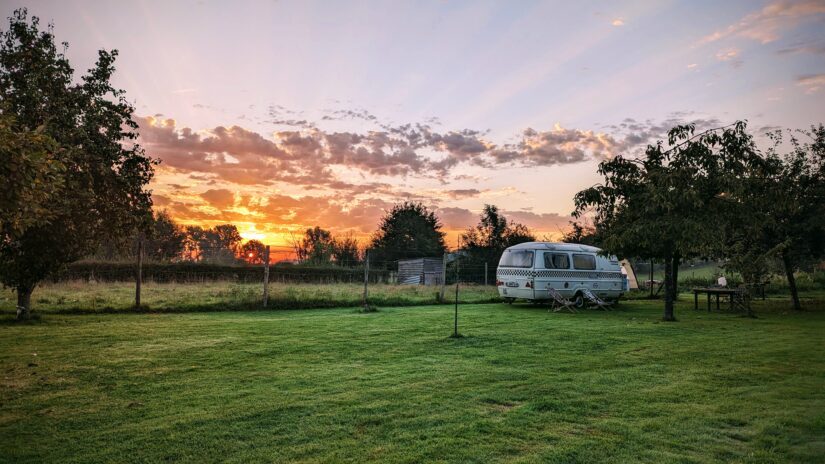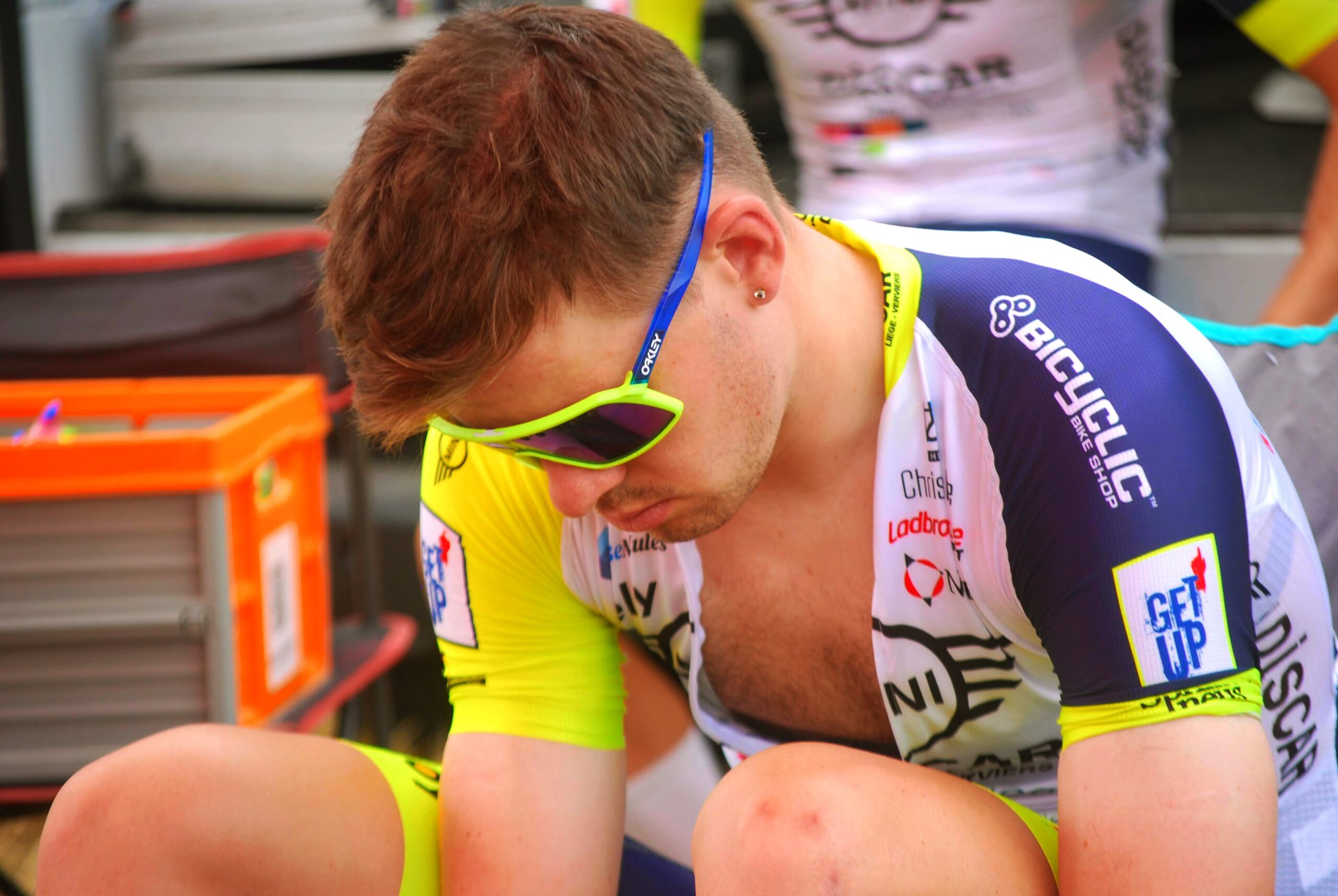Belgium is a country that is known as the Mecca for cycling. The Flandrien Hotel epitomises this. It lies on the doorstep of the Flemish Golden Triangle, making it a venue that puts you in the heart of the most famous roads in Belgium, nay, cycling history. It is the dream location for a cyclist, racer and cyclotourist alike, to come and revere in the history and culture of the bike, whilst honing their knowledge and craft of the cobbles, building their own story with each hellingen. The Flandrien Hotel is a training base, a museum, a home away from home.
Memorabilia
A task for you. Imagine your cycling haven. What is featured there? Bikes? Books? Clothes? Bidons? Well, anything you can imagine in terms of cycling memorabilia, the Flandrien Hotel has it. The memorabilia is present on the walls, encircling each and every room. On first impressions, it can be extremely overwhelming. I was tired, exhausted even, struggling to refuel the 188km day that I had just completed. The number of historic bikes overtook me. I was completely in awe. Hence, I had to say “Another day Jamie, or else I will be up until 4 am.” It took my utmost strength to shrug off the intensity presented by the vast collection on display throughout the entire venue.
Frankly, it is unbelievably impressive how the owners, Jamie Anderson and Bernard Moerman, have acquired such an array of the most famous bikes on the planet. From Mark Cavendish’s Time Trial bike to Saeco’s Cannondale. Once’s Giant, to Telekom’s Pinarello TT bike. My personal favourites are the numerous Cannondale’s hanging up in the secondary garage.
The first few days were an overwhelming experience, not least because all this noise–as a cycling fan–is hard to ignore. Especially when there is so much to be done settling into a new environment, during a big week of training on the road back to full fitness. There is no doubt, that over the three weeks I am at the Flandrien Hotel, patience will pay dividends. I will take in each piece in my own time. Even getting the chance to build up one of Robbie McEwen’s–the master tactician–bikes.
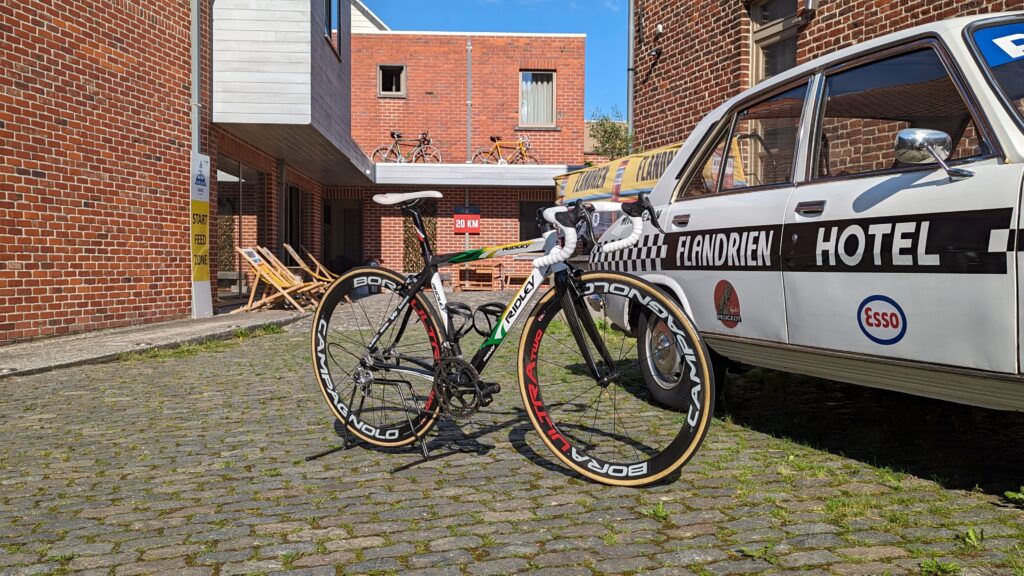
The Clubhouse
The hotel is for cyclists. Jamie and Bernard ensure that is the case. However, they are astute in welcoming ‘non-cycling guests.’ In their own words, “If you don’t love cycling before you arrive, you will by the time you leave!” The Flandrien Hotel is a base for like-minded people, in cycling and business to learn from each other.
Taking on other’s experiences in wide-ranging fields of expertise. Conversations about the sport, life and entrepreneurship aplenty. This is where The Clubhouse comes in. There is never a quiet moment in that communal space. I utilise the people sitting to the left and right of me. Taking in all the lessons I can do, in the short space of time that I am in their company.
In the first two weeks I’ve been at The Flandrien Hotel, I have learnt so much from the seemingly endless conveyor belt of tenants. I’ve learnt about leadership & leading a company–or rather people. Importantly, I’ve learnt lessons in how the entrepreneurial world can be carried across to different sports, and even into other business ventures. The main take-away? It’s all about people management.
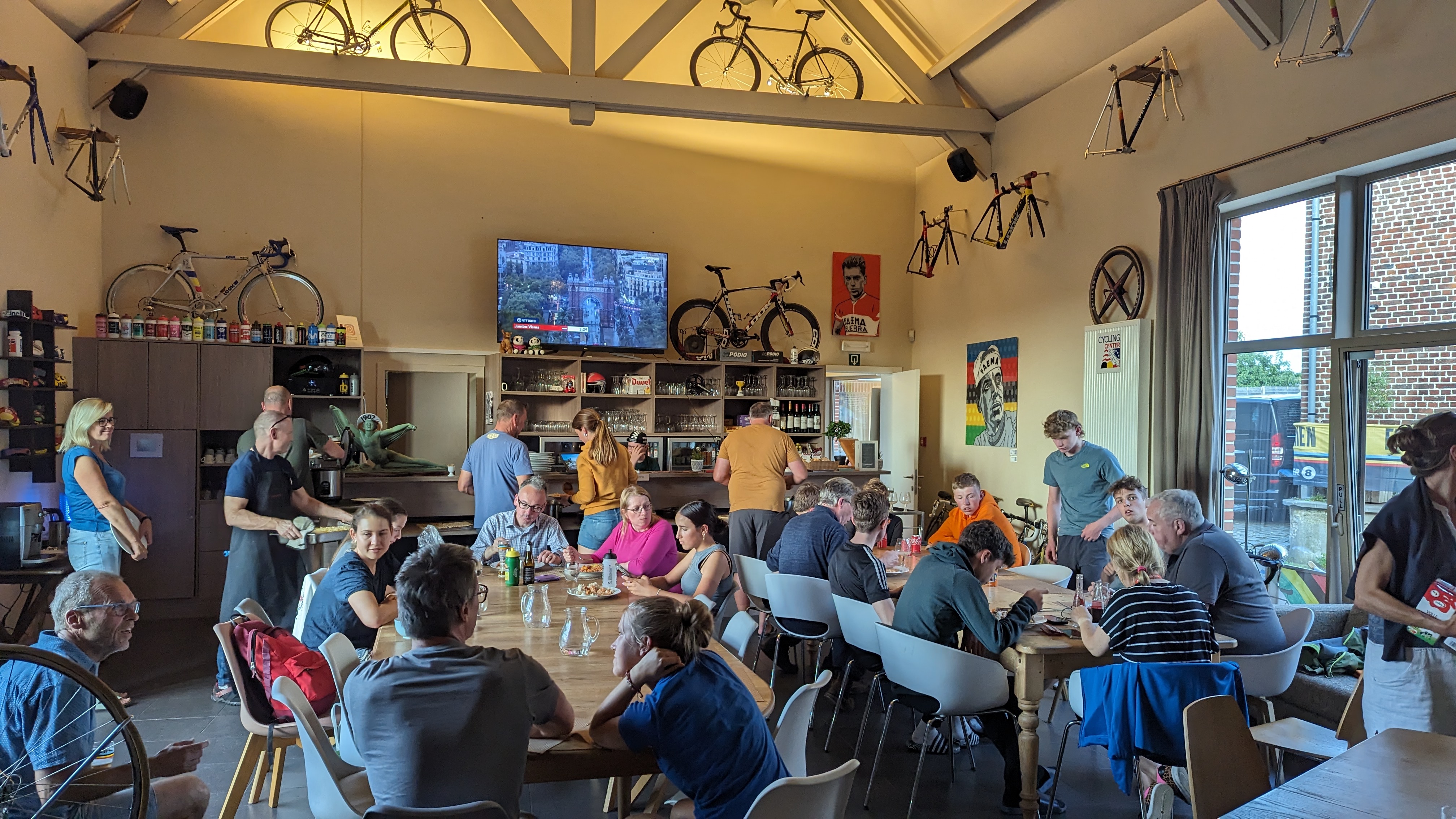
To illustrate the broad groups of people attracted to the hotel in Parike, there was a group of riders from North Wales who arrived for their first-ever weekend racing in Belgium. I admired them for giving it a go so young. Taken aback by the fact some of their riders, would compete in their first kermis koers at the sprightly age of 13, a year younger than when I began my Belgian journey in 2016.
Conversely, the following week, the well-versed Groupama FDJ Conti team would stay for a couple of nights ahead of the UCI-upgraded Muur Classic Geraardsbergen. Very different conversations were held over a plentiful supply of rice and pasta as they carbo-loaded for the following day’s race. We could connect on the same level having experienced UCI life as we build our careers.
There’s more! The clubhouse features a gigantic television screen which, besides the typical Netflix, YouTube and Disney, features the app from GCN. My stay at The Flandrien Hotel coincided with the exact three weeks that La Vuelta was raced. The clubhouse is the perfect place to put my feet up and enjoy the final hour of racing beside other people as invested in the intricate–questionable–tactics of this year’s event.
Writing
I must say, life is busy here. Though, I wouldn’t have it any other way. In an environment entirely built around cycling fanaticism it could be easy to get a bit lost in all that introspection. That’s why I must follow my routines to the tee. I am extremely proud–and now have confidence–that my routines have been steadfast despite the fairly unpredictable nature of the hotel environment. I’ve even improved some aspects of my daily routine–because I’m always looking to evolve a small part of myself, every day.
I took a newfound love for reading for more than just the thirty minutes leading up to my bedtime. I absolutely loved incorporating reading further chapters of an excellent book, whilst overlooking the rising sun on the damp bench with the cool air on my breath. It, for me, is the perfect way to start the day. Working perfectly in tandem to get my morning light in whilst fuelling early enough for my ride two hours later.
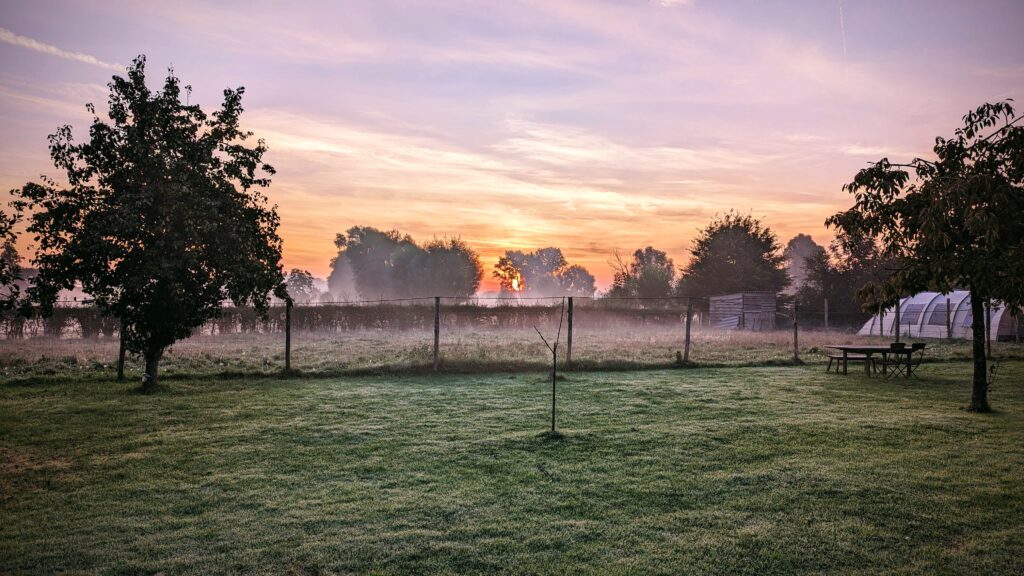
In addition to my enriched relationship with reading, I felt my writing improve. The process became more enjoyable with each day that passed at The Flandrien Hotel. On my first day at the hotel, I learnt some important lessons. Sander Kolsloot gave me copious amounts of confidence to pursue my writing. The words of encouragement coming from his experienced mind just hit a little bit differently. Sander’s kind words of encouragement and appraisal held some weight for me. So much so, that I have found a newfound rhythm and confidence in my writing. I’ve been very content with the pieces I’ve put together. Knowing that I am not obliged to publish everything I write down.
Though, I find it important that I assemble my thoughts into a coherent race analysis, in order to have a clear understanding of the lessons on offer from each event. It’s also crucial that my thoughts don’t fester in my brain too long after the events have passed. It helps keep me true and able to park it and move on to the next one. I believe it is another string to my bow, that I am able to articulate my thoughts in a way that comprises an interesting storyline so that in the future I may rewind it in my brain and, indeed, share it with future guests in the clubhouse.
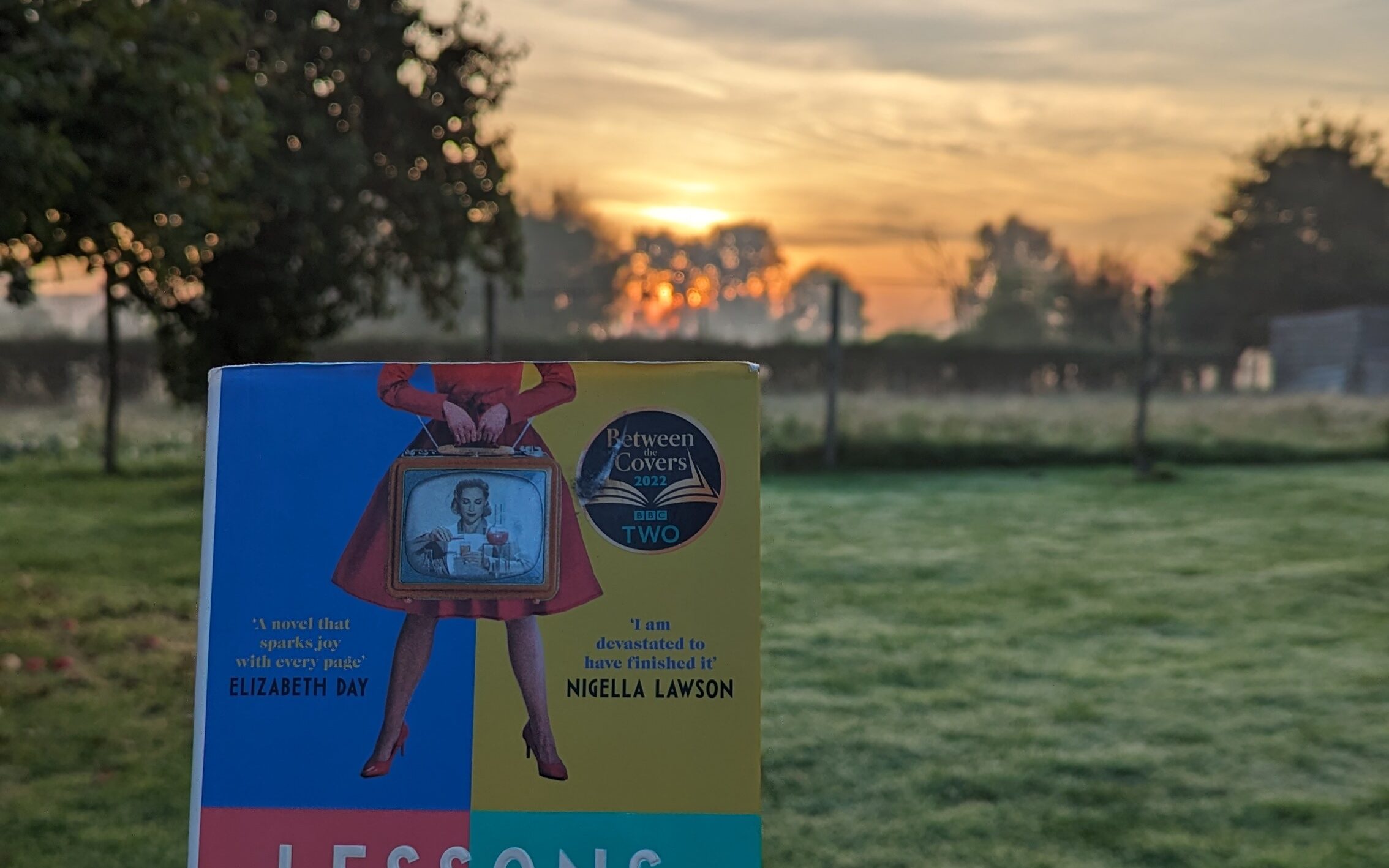
It excites me to follow a journey that first creates a story for each season, as I am an athlete, and we are all storytellers. Second I can look back on each race, and period in my ever-changing life, in a number of months and years to see how I got here. Third for the reader, as is evident in the current La Vuelta. We as fanatics love a good story–a fairy tale.
Home Away from Home
The Flandrien Hotel feels like a home away from home. It’s a cosy place once I’ve settled into place. But more than that, Jamie, Bernard and Ann are extremely welcoming. Striking me as incredibly intelligent and communicative people from the off. I was enthralled by our first conversations. So much so that I found myself seeking endless streams of advice, soaking in every word they said. I later started turning up to his front door with questions about the day’s race.
In many ways, I really wasn’t interested in what they had to say about the bike life. They did provide some assurances for me. Though, I was far more intrigued by their wisdom in their wider experiences. Jamie’s concise skills in communication and Bernard’s boundless knowledge of tying sporting endeavours to other areas of life, again on how to manage yourself in the presence of the people around me.
The feelings of homeliness they instilled in me the moment I arrived ensured there was respect for the place that I would now be living in for the following three weeks. At The Flandrien Hotel, they run a programme called the riders in residence; a programme that encourages riders to want to help out, and almost distracts them from the bike by completing tasks that interest them.
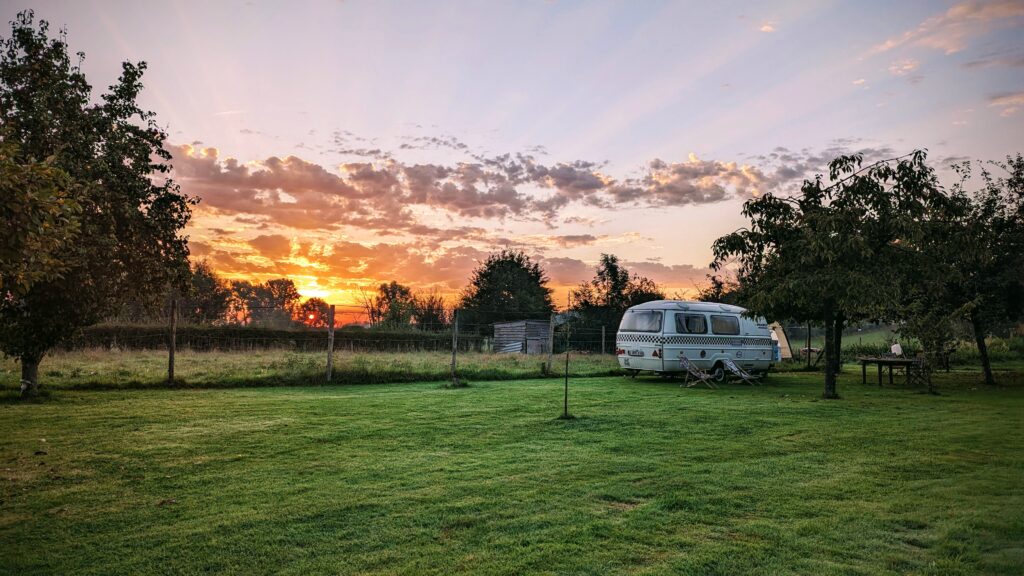
The first few days that I was exposed to the riders in residence I was stumped by the jobs I was required to do. The grandiose kitchen overpowering my senses. I’ve never experienced the other side of the swinging door synonymous with hospitality venues. I had no clue where to start. I no doubt naffed off the other riders in residence as I stood there limp, unknowing where to begin in the kitchen cleanup.
Jamie, with his background in leadership, saw my discomfort and was extremely accommodating. I sat down with Jamie and his list of tasks. I scanned the list for tasks I would be keen to participate in, ensuring I respected the place I called home. Once I’d named the tasks I was content, and the course of action was clear. Life is a transaction. Jamie’s affability meant I could get on with my routines, knowing that I’d have ample time to ensure the task was completed.
Joining the Dots
Robin Hobb once said, “Home is people. Not a place. If you go back there after the people are gone, then all you can see is what is not there any more.” Flanders, especially the Flemish Ardennes, have always felt like a home away from home. Why is that? Well, I live in the Surrey Hills, and if I look at the demographics, it becomes clear why it feels like a silhouette of home. The characteristics are extremely similar.
Much like the Surrey Hills, I have a story for each hellingen. A personal relationship with each one. Sitting down at the café–or in the clubhouse at the Flandrien Hotel–I can rattle through them as if I’m revising before a GCSE Geography paper. The names of every climb hold some weight, something mythical about them. The 100,000 attempts on Strava show the beguiling nature of the climbs in the Vlaamse Ardennen.
At home, I no longer need a map for guidance. I know precisely how long it is between any two climbs. How long it is until I get home, so I can always add a specific amount of climbing to the final section of my ride. I also know precisely the characteristics of each climb. How to pace them–when to go harder and when to go easier.
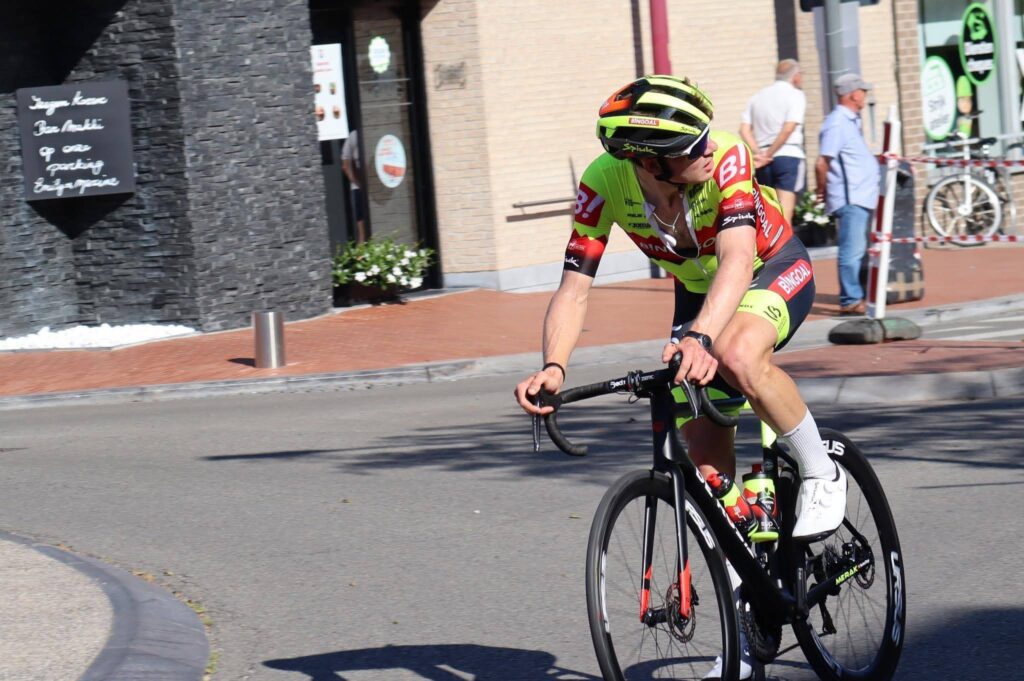
It’s this breadth of knowledge I seek from my stay at the Flandrien Hotel. The chance to develop my existing knowledge of the climbs in solitude. To join the dots on the map. Connecting the sinuous roads that connect the famed climbs. Eventually, I want to get to the point when I no longer require my head unit for guidance.
The aim is to build my knowledge and feel calm when I get the opportunity to race these roads. I want to know precisely what is around the next corner, just like I am back home descending the narrow, technical and steep Tanhurst climb. How quickly to take this descent, or what gear to take on that climb–the Kwaremont being a prime example. There are so many different ways to take on the climbs, yet only a few that truly work for me as an individual.
The Flandrien Hotel allowed me to connect the dots between many of life’s challenges that I experienced in those three weeks. I learnt so much about myself in dealing with the highs and lows of whatever life throws at you. I learnt a lot about my communication skills, and I learnt a lot about my own confidence levels and what I need to develop as a human.

